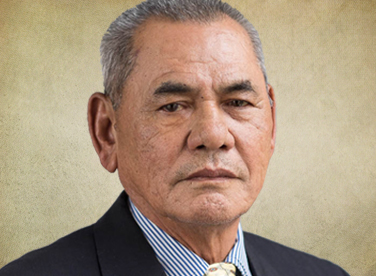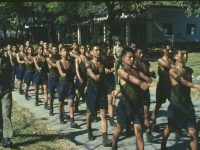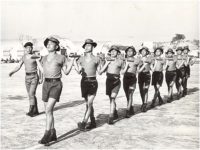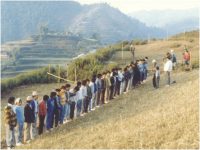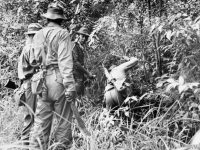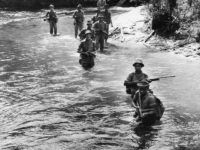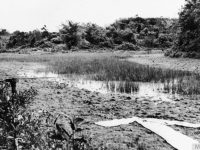Iswar Bahadur Sahi
Iswar Bahadur Sahi Rifleman
(Portrait © Gurkha Voices Oral History Project)
-
Recruit training
-
Basic Training Drill
-
The Galla Wala visiting villages
Like many Gurkha veterans, Iswar was born into a farming family in the rural district of Kaski. They lived in a house they built themselves with their grandparents next door. Iswar comes from a large family with two elder sisters and four younger brothers. All four brothers joined the Brigade of Gurkhas like Iswar. And like his brothers, Iswar fled from the family farm when he joined up and followed the recruiter known as the Galla Wala. His parents didn’t want them to join because they were afraid their sons would be killed in war. They also needed their sons to keep the farm going. He says they all lived happily and everyone got on with their jobs on the farm and enjoyed the occasional religious festival such as Dashain.
Iswar served as a machine gunner and rifleman during the Malaysia Confrontation during the 1960s. His platoon would track the rebels in the jungle for fourteen day periods before returning for a short break. They would sleep outside, mostly silent, using hand signals to communicate. The platoon was ambushed on more than one occasion.
Have you seen our short film made by the 308 Squadron Air Cadets of Colchester? Click here to view.
(More veteran stories are in our book, published later this year. Keep posted via our blog: www.gurkhastories.wordpress.com)
-
Daily life in the jungle
-
Patrolling for communist guerillas
-
Directing air strikes
Interview Extract (based on interpreter’s translation:
I fled to get entry into the army because mum and dad were worried that we would die with the wars and everything. They are happy that we have done it now, but at that time we were so young and all my brothers entered into the army but they didn’t tell our parents.
The [recruiting officer] would come back to villages and try to persuade younger boys to join the army and say, ‘You’ll get better clothes.’ The [recruiting officer] that persuaded us to come along, explained to me how we can eat lovely food and play football and basically life will be quite luxurious if you come and join the army. He persuaded me and walked with me to that recruitment centre for five days.
I had one bag with my clothes to change, and I walked along the jungle, and when it got dark we would sleep. There were about ten to fifteen of us so it was quite fun; we enjoyed it a lot. There were no serious talks, it was all just fun and laughter and singing, dancing, that kind of stuff, so very light-hearted.
When I arrived at the recruitment centre, the officers came and looked at our height, weight, took measurements of our chest and made us run and tried to see how well we could perform. The ones that couldn’t perform, they just used to say, ‘Go home, that’s fine.’ And the ones that were okay in height, weight and strength, they’d just keep them. I ate so much good food, like all the butter and milk!
[After selection] they taught us for one week where we just did marching and very, very basic training. Then we went to Calcutta, which is in India, to wait for the flight to Singapore. We didn’t do much there, just went around the place; it was a sort of transit camp. Then we went straight to Singapore, which was also another transit [camp].
Then we went to Malaysia for eleven months to train. The eleven months’ training, it was very, very hard, very tough, and they taught us how to fight and shoot. The hardest time was when they trained us not to eat or drink for twenty-four hours, and you need to survive in that situation (I found that very, very difficult) and still fight [on an] empty stomach and no water. It was so hard. All the skin used to come off my elbows and knees because of the crawling on the floor [for training exercises] and that’s when I remembered home.
I remember my platoon commander, a lieutenant, as a very caring and good man, and he used to give talks and say, ‘Don’t worry, you don’t have to fear anything. Show that you’re fearless, you have courage. You need to keep your mum and dad’s reputation so make them proud.’
So he used to remind us that we needed to do well for our home, our family and for our country; so he was very, very motivating.
Oral histories: © Gurkha Voices Oral History Project

